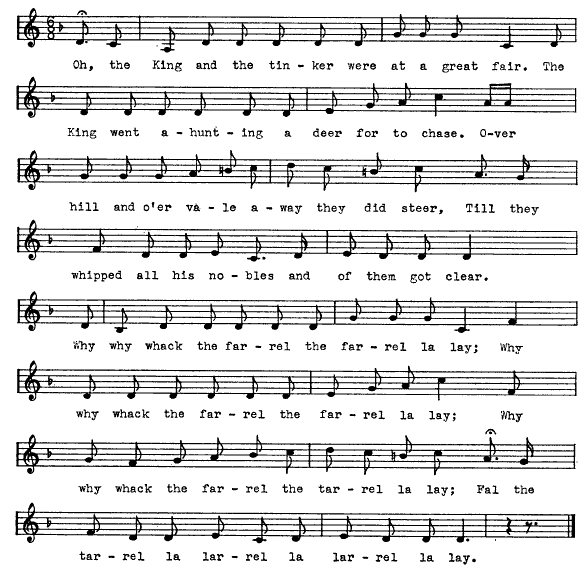US & Canada Versions 273. King Edward the Fourth (The King and the Tinker)
[According to Fowke: A fragment of "King James I and the Tinker," a form of Child 273, "King Edward the Fourth and a Tanner of Tamworth," has turned up in Ontario. This appears to be the first definite evidence of the ballad's survival in North America.]
CONTENTS:
The King and the Tinker- Shorthill (Ontario) 1964 Fowke (see below)
_______________
"The King and the Tinker"
by Edith Fowke
The Journal of American Folklore, Vol. 79, No. 313 (Jul. - Sep., 1966), pp. 469-471
"The King and the Tinker"
A fragment of "King James I and the Tinker," a form of Child 273, "King Edward the Fourth and a Tanner of Tamworth," has turned up in Ontario. This appears to be the first definite evidence of the ballad's survival in North America. Coffin, noting that Reed Smith listed Child 273 among American survivals in his South Carolina Ballads in I937 but not in his subsequent Southern Folklore Quarterly list in I937, concludes that the first entry was a mistake (The British Traditional Ballad in North America [Philadelphia, 1963], p. I43). As far as I can discover, "King James I and the Tinker" has not been reported from tradition in Britain for more than a century.
When I visited Fred Shorthill at his home in Balinafad, Ontario, some thirty miles west of Toronto, on March 27, 1964, he sang the fragment given below.
The King and the Tinker

Oh, the King and the tinker were at a great fair,
The King went a-hunting a deer for to chase.
Over hill and o'er vale away they did steer,
Till they whipped all his nobles and of them got clear.
CHORUS: Why why whack the farrel the farrel la lay;
Why why whack the farrel the farrel la lay;
Why why whack the farrel the tarrel la lay;
Fal the tarrel la larrel la larrel la lay.
Mr. Shorthill, who was then eighty, said his father used to sing the whole ballad, but this was all he could remember. (On a later visit he repeated it again in exactly the same form, but still could remember no more.) His grandparents came out from Tipperary in 1831 and presumably brought the ballad with them.
These lines do not parallel any of the texts Child gives, but their origin is clear when they are compared with the second stanza of the last reported traditional text of "King James I and the Tinkler" given in Dixon's Ballads and Songs of the Peasantry of
England ([London, 18463, pp. 109-112), as recited by Francis King, the "Skipton Minstrel":
As he was a-hunting, he swift fallow-deer,
He dropped all his nobles; and when he got clear,
In hope of some pastime away he did ride,
Till he came to an alehouse, hard by a wood-side.
Dixon notes that Percy mentions the ballad but that it is not in the Reliques or in any other popular collection, although it appeared in a few broadsheets and chapbooks. Dixon's text from Francis King was reprinted in Bell's Ancient Poems, Ballads and Songs of the Peasantry of England ([London, 18573, pp. 292-295), in Holroyd's Collection of Yorkshire Ballads, edited by Forshaw ([London, 18923, pp. 232-235), in J. Horsfall Turner's Yorkshire Anthology ([Bingley, England, 19090, pp. 68-69), and in the Journal of the English Folk Dance and Song Society (III [1936], pp. 63-64) In the Journal Miss A. G. Gilchrist gives a tune, "The King and the Tinker," from a sheet of manuscript airs found among the papers of the late Frank Kidson, which she calls "the Edinburgh MS" because it was postmarked Edinburgh, December 23, 1903. Miss Gilchrist says that Dixon's text "is the only copy known to me," and the air she gives appears to be the second reported for the ballad, the other being in Petrie's The Complete Collection of Irish Music (London, 1902-1905).
Another traditional text is given by James Maidment in his Scotish Ballads and Songs ([Edinburgh, 18593, pp. 92-97), with the note: "There is in a small collection of songs, probably unique, printed at Edinburgh, without date-but certainly not later than 1730-the present version of 'The King and the Tinkler'." That text is even more closely related to Mr. Shorthill's fragment for it begins:
The King and his nobles,
They went out a race,
They went out a-hunting,
The deer for to chase.
Over hills and high vallies,
I'll make it appear,
For he lost all his nobles,
And often got clear.
In his discussion of the ballad, Maidment suggests that its hero was not James I of England but "the fifth James of Scotland-who had an especial delight in such adventures, and who was as good natured as he was courageous." King James V of Scotland (1512-1542) was the father of Mary Queen of Scots; King James I of England (James VI of Scotland) was his grandson and came to the English throne on the death of Elizabeth in I603. Maidment argues: "It is very questionable whether the 'sapient' monarch, who for the first time united the two Crowns, would have had 'pluck' enough for carrying out such a frolic with the Tinker. He was too much alarmed for his personal safety to run risks of any kind, and although no king relished jokes-some of them coarse enough in all conscience-more than he did, he took very good care not to expose himself to any unnecessary hazard. If James had lost himself while hunting and had fallen in with the Tinker, he would have been too much frightened to have thought of amusing himself at his expense."
Toronto, Ontario, Canada
EDITH FOWKE